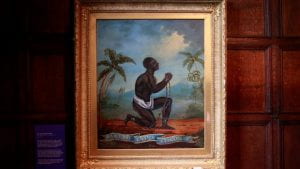The Washington Post begins “The 1619 Project and the far-right fear of history” with this lead:
In the summer of 1619, two warships manned by English privateers raided a Portuguese vessel the pirates hoped was brimming with gold. Instead, they found and divided up an altogether different cargo: some 350 African slaves, taken in bondage possibly from what is now Angola. What happened to all those poor souls may never be known — they were among the early wave of the more than 12 million Africans sent across the Atlantic to live and die in slavery in the New World.
But we do know that, in August of that year, the English privateers appeared not far from the colony of Jamestown, in modern-day Virginia, and bartered 20 to 30 of these Africans for food from the English settlers there. That transaction 400 years ago marked the first landfall of black people on the shores of what would become the United States.
If you haven’t heard of the 1619 project, the project emerged on the occasion of the 400th anniversary arrival of slavery in America via privateers in Jamestown. The Washington Post lauds this “ambitious series of reported essays published in a special issue of the New York Times magazine this past weekend. The ‘1619 Project’ takes this arrival as a seminal event with which to reframe the history of the United States. It charts how — from prison systems to land laws, the origins of capitalism to the evolution of the American diet — there’s little that defines the United States that doesn’t somehow have the legacy of slavery at its foundation.”
You can check out this article, which links to lots of supporting material, including the New York Times magazine article, at
https://www.washingtonpost.com/world/2019/08/20/project-far-right-fear-history/





